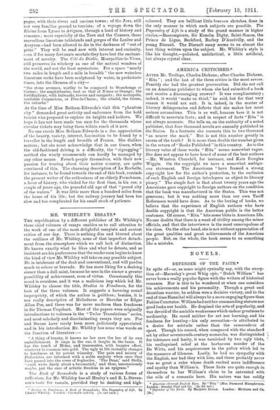MR. WHIBLEY'S ESSAYS.* THE republication by a different publisher of
Mr. Whibley's three chief volumes of essays enables us to call attention to the work of one of the most delightful essayists and acutest critics of our day. There is nothing dim and blurred about the outlines of Mr. Whibley, none of that imperfect detach- ment from the atmosphere which we call lack of distinction. He knows exactly what he likes and what he detests, and so insistent are his preferences that the reader soon begins to know the kind of view Mr. Whibley will take on any possible subject. He is intolerant of the drab and conventional, and will pardon much to colour or bravado. He has more liking for a dashing sinner than a dull saint, because he sees in the sinner a greater possibility of achievement, even of virtue. Occasionally this mood is overdone, and it was a malicious imp which led Mr. Whibley to choose the title, Studies in Frankness, for the best of the three volumes. It suggests a hovering round impropriety, of which the author is guiltless ; besides, it is not really descriptive of Heliodorus or Herodas or Edgar Allan Poe, and there was far more madness than frankness in Sir Thomas Urquhart. Most of the papers were originally introductions to volumes in the " Tudor Translations " series, and most scholarly and discriminating essays they are. Poe and Sterne have rarely been more judiciously appreciated, and in his introduction Mr. Whibley has some wise words on the function of literature
A thing of beauty, it knows no law save the law of its own embellishment. It sings in the ear, it laughs in the brain. It has the touch of Midas, and transmutes, with happier effect, whatever is common into gold. The ugly in life instantly changes to loveliness at its potent wizardry. The pain and misery of Philoctetes are informed with a noble majesty when once they have passed into the verse of Sophocles. 'The Dean,' said Stella, ' could write finely about a broomstick,' and thus, unconsciously maybe, put the case of artistic freedom in an epigram."
The Book of Scoundrels is a study of various forms of ruffionism, for Mr. Whibley has all Henley's and R. L. Steven- son's taste for rascals, provided they be dashing and high- • Studies in Frankness; A Book of Scoundrels ; The Pageantry of Life. By Charles Whibley. London: Corstable and Co. Ds. net each.]
coloured. They are brilliant little bravura sketches, done in the only manner in which such subjects are possible. The Pageantry of Life is a study of the grand manner in higher circles,—Bassompierre, Sir Kenelm Digby, Saint-Simon, the Prince de Ligne, Beckford, Barbey D'Aurevilly, and the young Disraeli. The Disraeli essay seems to us almost the best thing written upon the subject. Mr. Whibley's style is like his thought,—polished, antithetical, a little artificial, but always crystal clear.






































 Previous page
Previous page